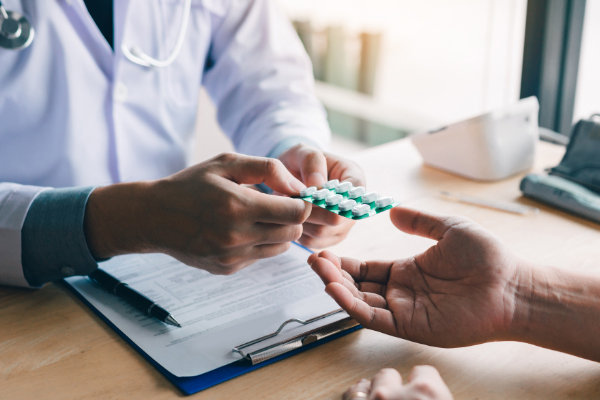Prescription painkillers are given to patients who are enduring pain either from an injury or medical condition that causes pain. Prescription pain killers are opioids which means they pose a huge risk for causing addiction. Opioid drugs reduce pain by flooding the body with endorphins and dopamine. So when a person is suffering in pain, opioids make them feel better. However, when someone is suffering emotionally and doesn’t like how they feel and are also experiencing physical pain, they will get pain relief and enjoy the effect because it changes their mental and emotional states. The most commonly prescribed painkillers are Vicodin, Percocet, OxyContin, Norco, Tylenol 3, and Darvocet.
Tips for Preventing Addiction to Prescribed Painkillers
The first recommendation to prevent addiction to painkillers is not to take any opioid medication without direct doctor supervision or tell your doctor if you are susceptible to addiction. The following tips are essential if you or a loved one is getting a prescription painkiller to avoid getting addicted.
Tip One: Take as Prescribed
Always use the medication as directed. Opioids are powerful medications and taking more than the prescribed dose can easily cause an accidental overdose. Additionally, taking too much of an opioid will make you vomit or become extremely drowsy. It is not safe to double the dose at any time. Taking prescription painkillers as directed will ensure that you don’t overdose or get sick. If you are not getting relief from your pain, your doctor must give you a different painkiller that will be effective. Taking more will not guarantee relief, and it is dangerous.
Tip Two: Do Not Drink Alcohol or Take Drugs with the Painkiller
Combining alcohol with prescription painkillers is dangerous because alcohol will increase the effects of the opioid since both substances are typed as central nervous system depressants. What this means is that the breathing rate that is already slowed down by the effects of opioids will double when alcohol is consumed. Similarly, other drugs can also increase the painkiller’s potency or confuse the brain and cause neurological damage. Benzodiazepines are particularly lethal to take with opioids. Like alcohol, benzodiazepines are central nervous system depressants, but they work in other brain regions, affecting nerves and muscle responses.
An opioid overdose can happen if you mix an opioid with other medicines, illegal drugs, or alcohol. An overdose can be fatal when mixing an opioid and certain anxiety treatment medicines, such as Xanax or Valium. (NIH)
Tip 3: Monitor Your Reactions to Painkillers Closely
It is always important to know the adverse reactions to any medication for allergic reactions that can cause Anaphylaxis or other emergencies. Still, there are different reactions that someone must record to stay aware of the drug’s effects. Prescription opioid painkillers, in general, will make you feel sleepy and have some nausea. The ‘high’ that many people say they feel from pain pills is relaxation, euphoria, or feeling at peace, slightly energic, and calm. Your reactions to how the pain killers affect you will alert you if you enjoy the effects too much. Self-awareness of addictive tendencies is often the fastest way to prevent full-blown addiction.
Tip 4: Know the Warning Signs of Abuse and Addiction to Prescription Painkillers
The warning signs of abuse or addiction occurring with a prescription painkiller can be very subtle, mainly at first. The following signs can happen right away or after some months of use. If you or a loved one is experiencing the following, addiction is likely either beginning or already occurring.
- Lying about pain to get more painkillers
- Seeing more than one doctor acquire prescriptions
- Missing school or work often
- Change in sleep habits (more or less)
- Cravings for more painkillers
- Feeling withdrawal symptoms when they run out of painkillers
Tip 5: Belief What the Experts Recommend About Taking Prescription Painkillers
The National Institute on Drug Abuse states what prescription painkillers are and how they cause addiction. NIDA also explains the best treatment methods for anyone abusing or addicted to an opioid prescription painkiller.
“Prescription opioids used for pain relief are generally safe when taken for a short time and as prescribed by a doctor, but they can be misused. People misuse prescription opioids by either taking medicine in a way or dose other than prescribed, taking someone else’s prescription medicine, or taking medicine for the effect it causes-to gets high. A range of treatments including medicines and behavioral therapies are effective in helping people with opioid addiction.” (NIDA)
Evoke Wellness at Cohasset Provides Same Day Admission to Comprehensive Opioid Treatment and Medically-supervised Opioid Detox.
Get Help from Prescription Painkillers at Evoke Wellness at Cohasset
If you or a loved one are suffering from prescription painkillers, or just about any type of pain medication addiction, there is hope. We at Evoke Wellness at Cohasset, know what it is like to have an addiction and are always here to help, no matter how bad your addiction, we can help you. First, give us a call and ask any questions, and do not worry as all calls are free and 100% confidential. One of our addiction specialists will help you find the best evidence-based addiction treatment program for you. No one should have to live with the burden addiction can put on your life, mind, and body.




